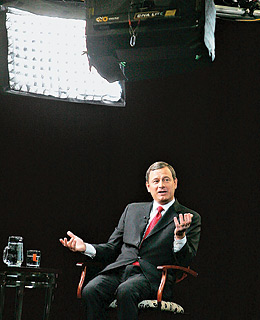
John Roberts
Rarely in our history has a more qualified lawyer than John Roberts been appointed Chief Justice of the U.S. At age 52, he is among the youngest Chief Justices in history. Since he is likely to preside over the high court for decades, his appointment may well be among President George W. Bush's most enduring actions. His early decisions and questions from the bench suggest that Roberts has figured out how to achieve substantive results without appearing to be results oriented or activist. He accomplishes this through the technical mechanism of "standing," which means a litigant's power to challenge the actions of the government. If a litigant lacks standing, that means the governmental action—even if theoretically unconstitutional—cannot be challenged in court. Roberts' statements suggest that he would deny standing to citizens who challenge on First Amendment grounds the Bush Administration's giving money to church groups that proselytize. He would also deny standing to those who challenge the Administration's environmental policies. We must wait and see whether Roberts seeks to apply his views of standing in a neutral manner or whether he will pick and choose depending on whether he approves of the substantive outcome. Stay tuned.
Dershowitz is a professor at Harvard Law School